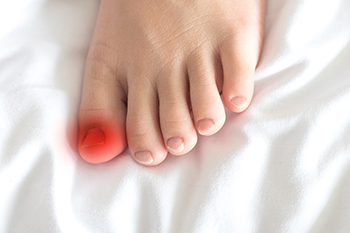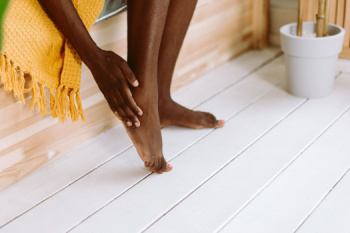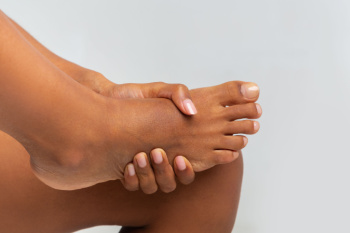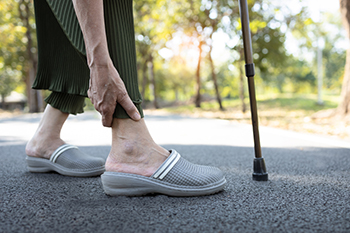
Sometimes it is the smallest edge of a toenail that causes the most discomfort. An ingrown toenail occurs when the nail’s side grows into the surrounding skin, often from wearing tight shoes, improper trimming, or genetic shape. But beyond pain, swelling, and redness, this condition can lead to deeper problems. When bacteria enter the broken skin, infection may follow, especially in people with diabetes or weakened immunity. Over time, what began as a minor nuisance can become a recurring issue, interfering with daily life and walking. Home remedies may offer short-term relief, but professional care addresses the underlying cause and helps prevent it from returning. If the area is swollen, draining, or painful to the touch, it is time to stop waiting. If you have an ingrown toenail that is worsening or not healing, it is suggested that you see a podiatrist for a diagnosis and appropriate treatment.
Ingrown toenails may initially present themselves as a minor discomfort, but they may progress into an infection in the skin without proper treatment. For more information about ingrown toenails, contact Gregory Rorick, DPM of Rorick Podiatry, PC. Our doctor can provide the care you need to keep you pain-free and on your feet.
Ingrown Toenails
Ingrown toenails are caused when the corner or side of a toenail grows into the soft flesh surrounding it. They often result in redness, swelling, pain, and in some cases, infection. This condition typically affects the big toe and may recur if it is not treated properly.
Causes
- Improper toenail trimming
- Genetics
- Improper shoe fitting
- Injury from pedicures or nail picking
- Abnormal gait
- Poor hygiene
You are more likely to develop an ingrown toenail if you are obese, have diabetes, arthritis, or have any fungal infection in your nails. Additionally, people who have foot or toe deformities are at a higher risk of developing an ingrown toenail.
Symptoms
Some symptoms of ingrown toenails are redness, swelling, and pain. In rare cases, there may be a yellowish drainage coming from the nail.
Treatment
Ignoring an ingrown toenail can have serious complications. Infections of the nail border can progress to a deeper soft-tissue infection, which can then turn into a bone infection. You should always speak with your podiatrist if you suspect you have an ingrown toenail, especially if you have diabetes or poor circulation.
If you have any questions, please feel free to contact our office located in New York Mills, Utica, NY . We offer the newest diagnostic and treatment technologies for all your foot care needs.

Heel pain can affect individuals of all ages. It is not tied to your level of activity, but often stems from conditions like plantar fasciitis, heel spurs, Achilles tendonitis, or bursitis. Plantar fasciitis, a leading cause of heel pain, occurs when the ligament supporting the foot’s arch becomes inflamed due to overuse or stress. The pain is often sharp, especially with the first few steps in the morning. Heel spurs, which are bony growths on the heel, can develop from prolonged strain on the foot. Achilles tendonitis causes pain at the back of the heel where the tendon connects to the calf muscle, often triggered by repetitive activity or poor footwear. Bursitis, inflammation of the fluid-filled sacs cushioning the heel, can also cause discomfort. A podiatrist can help identify the underlying cause of your heel pain through physical exams and diagnostic imaging like X-rays. Treatment may include rest, targeted exercises, orthotics, or even surgical options for severe cases. If you are experiencing ongoing heel pain, it is suggested that you make an appointment with a podiatrist.
Many people suffer from bouts of heel pain. For more information, contact Gregory Rorick, DPM of Rorick Podiatry, PC. Our doctor can provide the care you need to keep you pain-free and on your feet.
Causes of Heel Pain
Heel pain is often associated with plantar fasciitis. The plantar fascia is a band of tissues that extends along the bottom of the foot. A rip or tear in this ligament can cause inflammation of the tissue.
Achilles tendonitis is another cause of heel pain. Inflammation of the Achilles tendon will cause pain from fractures and muscle tearing. Lack of flexibility is also another symptom.
Heel spurs are another cause of pain. When the tissues of the plantar fascia undergo a great deal of stress, it can lead to ligament separation from the heel bone, causing heel spurs.
Why Might Heel Pain Occur?
- Wearing ill-fitting shoes
- Wearing non-supportive shoes
- Weight change
- Excessive running
Treatments
Heel pain should be treated as soon as possible for immediate results. Keeping your feet in a stress-free environment will help. If you suffer from Achilles tendonitis or plantar fasciitis, applying ice will reduce the swelling. Stretching before an exercise like running will help the muscles. Using all these tips will help make heel pain a condition of the past.
If you have any questions please contact our office located in New York Mills, Utica, NY . We offer the newest diagnostic and treatment technologies for all your foot and ankle needs.

The feet are essential yet often overlooked parts of our body. With 26 bones, 33 joints, and a network of nerves and blood vessels, they provide the stability and balance necessary for every step you take. When issues arise, whether it is discomfort or more serious conditions, the pain can be intense and disrupt daily life. This is particularly true for those with diabetes, as foot complications can quickly escalate into severe problems. Ignoring foot health can lead to chronic pain, mobility problems, and even severe conditions like infections or deformities. Wearing shoes that fit properly and taking time for foot care are key to preventing these issues. A podiatrist can help diagnose foot problems early and offer solutions, from custom orthotics to treatment for existing conditions. They can guide you in maintaining healthy feet and prevent further complications. If you are dealing with foot pain or other issues related to your feet, it is suggested that you make an appointment with a podiatrist.
Everyday foot care is very important to prevent infection and other foot ailments. If you need your feet checked, contact Gregory Rorick, DPM from Rorick Podiatry, PC. Our doctor can provide the care you need to keep you pain-free and on your feet.
Everyday Foot Care
Often, people take care of their bodies, face and hair more so than they do for their feet. But the feet are a very important aspect of our bodies, and one that we should pay more attention to. Without our feet, we would not be able to perform most daily tasks.
It is best to check your feet regularly to make sure there are no new bruises or cuts that you may not have noticed before. For dry feet, moisturizer can easily be a remedy and can be applied as often as necessary to the affected areas. Wearing shoes that fit well can also help you maintain good foot health, as well as making it easier to walk and do daily activities without the stress or pain of ill-fitting shoes, high heels, or even flip flops. Wearing clean socks with closed shoes is important to ensure that sweat and bacteria do not accumulate within the shoe. Clean socks help to prevent Athlete’s foot, fungi problems, bad odors, and can absorb sweat.
If you have any questions please feel free to contact our office located in New York Mills, Utica, NY . We offer the newest diagnostic and treatment technologies for all your foot and ankle needs.

Elderly foot care is essential, as aging can lead to various foot conditions like arthritis, stress fractures, and fallen arches. Arthritis in the feet causes joint pain, swelling, and stiffness, often making walking difficult. Stress fractures, which are small cracks in the bones, can result from weakened bones and repetitive stress, causing pain, swelling, and difficulty bearing weight. Fallen arches, or flat feet, occur when the arches of the feet collapse, leading to pain and discomfort in the feet, knees, or lower back. These conditions can result from the natural aging process, loss of bone density, or prior injuries. The pain and discomfort can significantly affect mobility and quality of life. A podiatrist can help by providing treatments such as custom orthotics, pain management, targeted exercises, or, in some cases, surgery. They can also recommend footwear modifications to alleviate pressure and improve comfort. If you are dealing with foot pain, it is suggested that you make an appointment with a podiatrist.
If you need your feet checked, contact Gregory Rorick, DPM of Rorick Podiatry, PC. Our doctor will attend to all of your foot and ankle needs and provide you with quality treatment.
Geriatrics and Podiatry
When people age, some common issues that may occur are bone density loss, dry skin, poor circulation, and rough brittle nails. These issues may also affect your foot health if the necessary steps are not taken to alleviate the problems.
It is important to take care of your feet because feet that are injured or diseased can affect your overall health. Having painful feet hinders your ability to do daily activities or may decrease your willingness to do the things that you need to do.
Visiting Your Geriatrician
As we age, health problems become more likely, so it is essential to visit your doctor for check-ups to ensure that you are doing the best you can to take care of your health. It is recommended to check your feet frequently for any possible cuts, bruises, swelling, corns or any other irregularities.
Taking Care of Elderly Feet
Cracked or dry feet can be treated by applying moisturizer often. It is also important not to wear old socks because the older the sock is, the higher the possibility there will be that there is bacteria there. Wear fresh socks and make sure they fit properly.
Proper foot health means that you can have a more active lifestyle and you will not be bogged down by pain. Foot health also leads to good circulation, which is paramount for overall health.
If you have any questions, please feel free to contact our office located in New York Mills, Utica, NY . We offer the newest diagnostic tools and technology to treat your foot and ankle needs.









